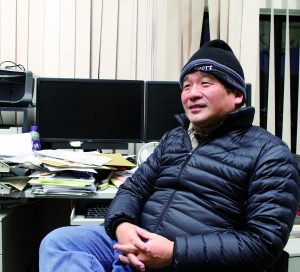Volunteers and social service sector workers like the social worker intern who helped Wing, can help to bridge the chasm between street sleepers and society. Peter Chiu Yat-fai, life education administrator for the Christian charity, Mission to New Arrivals Ltd, also volunteers with the homeless. He says sometimes street sleepers just want friends to talk to who do not mind that they sleep on the streets.
“To these street sleepers who have a job, it’s not about how we can help them, but about recognition and appreciation,” says Chiu. “When we visit the homeless, they don’t want us to see them as poor or give many things to them, nor pity them. We just need to treat them as people who chose to settle on streets.”
Chiu has built close relationships with a couple of street sleepers and recalls the fun times he had with one of his homeless friends, enjoying hotpot during winter in Tai Kwok Tsui. “Sometimes we [volunteers] also ask ourselves if there is any problem with being homeless…It is typical to stereotype those people [homeless], that they sleep on the street for bad reasons,” Chiu adds.
However, there is still a strong social stigma attached to being homeless. Chiu’s job involves educating children and teenagers about social affairs. He often leads tours to sub-divided units and cage houses. He recalls the response of a Primary Five student who was asked to imagine if one of his classmates lived in a sub-divided unit. “He said he would break off their friendship,” says Chiu, shivering at the memory.
Wong Hung, an associate professor at the Chinese University of Hong Kong who has conducted extensive studies on the homeless, looks at  the problem in a macroscopic way. He blames the surging cost of living and rent. “It is really hard for them [the homeless] to survive on the minimum wage,” says Wong.
the problem in a macroscopic way. He blames the surging cost of living and rent. “It is really hard for them [the homeless] to survive on the minimum wage,” says Wong.
“I think the solution is the institutional and policy one; it is not by individual effort that you can counter this,” says Wong. He believes making affordable and suitable housing available is the way out to resolve this problem.
Wong points to a flaw in city planning where many public rental housing units are located in the New Territories, which are far from the city centre where most of the jobs are. As a result, public housing residents in those areas often remain unemployed and live on CSSA.
Wong is now looking into the possibilities of turning old urban houses reclaimed by the Urban Renewal Authority into interim housing to rehouse the young homeless.
“If the government thinks about letting NGOs run this, if it’s cheaper than that, HK$80 or HK$70 per night just for Hong Kong residents, or if you can charge the visitors a higher rate…then it becomes a social business,” Wong says. He is also considering the feasibility of using abandoned primary or secondary schools.
The plight of the working homeless cannot be solved through individual action. But in the meantime, Wong says there is still much the general public can do to reach out to them, by considering, “the social side I would say, the social network, the social need. The emotional need, rather than just physical needs or the basic needs of the homeless people.”
Edited by Kelly Wong






































